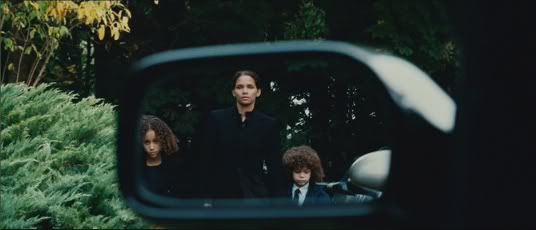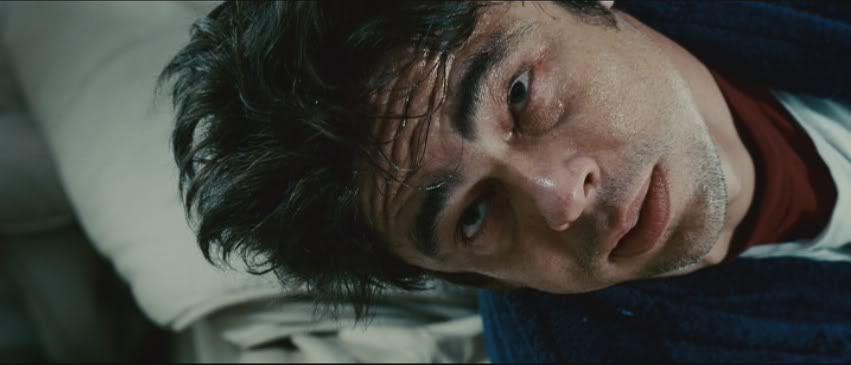
Watching Things We Lost in the Fire, I was confident that the screenplay had been adapted from a novel or a play, or possibly a foreign film (its director is Susanne Bier, the Danish auteur behind Brothers and this year’s Foreign Oscar winner In a Better World). It’s not that the film itself is literary or stagey, starched by its devotion to some exterior source material. The cinematography is actually quite striking and the sets are fluid and deliberately assembled. The simple fact is that few movies get made like this anymore. It’s a very simple film whose sole concern is its characters, in the same vein as classics like The Best Years of Our Lives or Friendly Persuasion or The Sundowners.
The film is so observant of its characters, so focused on the beats and nuances of human life, so assured that the story it’s telling is the right one, that it doesn’t seem possible that it could be an “original” idea. In truth, Things We Lost in the Fire is a spec script from Allan Loeb, an unknown at the time the film was made in 2007 who is now just about everywhere. (Everywhere, unfortunately, includes such clunkers as 21, The Switch, The Dilemma and the Adam Sandler vehicle Just Go with It. His descent into schlock is inexplicable, but at least he’s working.)

Recently widowed by a sudden, violent act, Audrey Burke (Halle Berry) invites her husband Brian’s (David Duchovny) heroin-addict childhood friend Jerry (Benicio Del Toro) into her home. Once he’s there, the pair walk a delicate tightrope. Audrey is uncomfortable with how easily Jerry assimilates into the family, including her two young children, Harper and Dory. Jerry is uncomfortable with the burgeoning sexual attraction between he and Audrey and with the instability that’s a byproduct of Audrey’s grief (in one scene, she asks him what shooting heroin is like, telling him she wants to “escape”).
The overarching plot is actually a bit thin, but like a good novel the devil is in the details. Loeb and Bier reward attentive viewers by meting out insights into the characters. The screenplay is interested in the little white lies characters tell themselves and others. To get Jerry into her home, Audrey tells him she has a mortgage to pay and his eventual rent payments will make that easier to bear. We later find out that her deceased husband has left his family comfortably well-off. Meanwhile, Brian co-opted one of Jerry’s sage pieces of advice and Jerry has co-opted Brian’s two kids as his own, interestingly to avoid a romantic advance.
Supporting characters are similarly well-drawn. John Carroll Lynch (the creepy squirrel-keeper in Zodiac) plays an affable neighbor, quietly hating his domineering wife. Alison Lohman (Drag Me to Hell) is a former addict who has gotten her shit together and hopes to help Jerry do the same, although she has some ulterior motives herself. Audrey’s family, including Omar Benson Miller (Spike Lee’s gentle giant in Miracle at St. Anna) and Paula Newsome (a familiar face but unknown name from various TV shows), are at once supportive and stifling.
Also important are the complex issues that are, just like life, left to drift away from the character’s grasps. The film doesn’t try to answer all the questions for us and doesn’t apologize for not doing so, either.

The most important character arc is Audrey’s and Halle Berry does a magnificent job as a woman blindsided by grief but holding it together for her children. In quiet moments with Jerry, away from the prying eyes of family and neighbors and her own children, she reveals the turmoil roiling underneath. Finally, after it’s clear that her children are progressing through their own grief, Audrey breaks down. But even then Berry doesn’t over-do it. Her performance is wrenching but never melodramatic.

Del Toro gets the showier role in the film, but he exercises a similar restraint. Every step of the way, his character is confused about his place in his adoptive family. He takes pains not to overstep his bounds, and yet he still crosses them. Later, when the audience is let in on the physical pains he goes through withdrawing from heroin, Del Toro's suffering is very real. I’ve never witnessed the process myself, thankfully, but it seems like a good approximation. He’s enthralling and yet not a sideshow.
It’s unfortunate that Things We Lost in the Fire didn’t get the attention it richly deserved back in 2007, when it was dumped into theaters with little fanfare. Since then, Bier has gone back to her native Denmark and made award-winning films, content to avoid the Hollywood system that tossed her a bone and then kicked her back to the curb. Halle Berry took a long hiatus and gave the Oscars another go with the multiple-personality drama Frankie & Alice. I haven’t seen it, but it seems like a move made out of desperation. Del Toro spent a year in the jungle with Steven Soderbergh on Che and picked up a kudos from Cannes for his effort, although little else. The Wolfman, his first real attempt at a blockbuster, blew up in his face last year. The next place to you can see the work of Allan Loeb, who showed such promise here, will be So Undercover, a Miley Cyrus sorority comedy. Angels cry.
Three of them should be a lot farther in their (Hollywood) careers given the tour de force that is Things We Lost in the Fire. Alas, they only get a thumbs up from me, nearly four years after the fact.

No comments:
Post a Comment